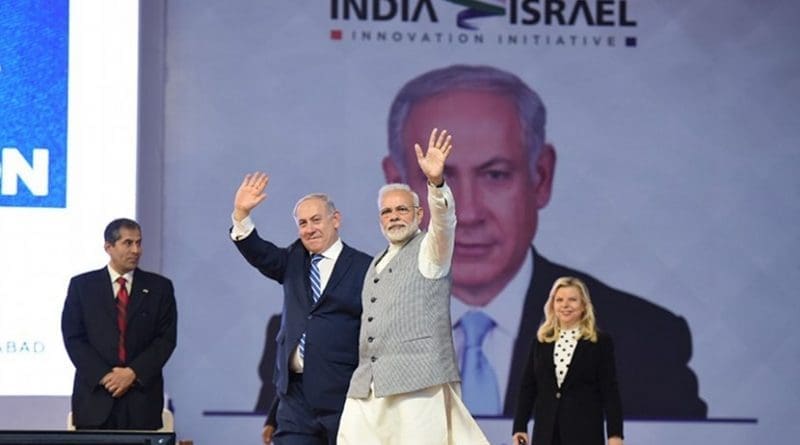India-Israel Bonehomie And International Normative Concerns – OpEd
The recent Israel-Hamas crisis saw Indian Prime Minister Narendra Modi issuing a resolute statement in support of Israel, signaling a momentous juncture in the ever-evolving India-Israel relationship. This rapid response and unambiguous backing for Israel’s stance on the crisis underscore the remarkable transformation of India’s foreign policy.
Delving into the historical backdrop, it’s essential to remember that until 1992, India maintained no diplomatic relations with Israel. The founding fathers of India’s independence movement, including Jawaharlal Nehru, were initially reticent about recognizing Israel. For more than four decades, they refrained from responding to Israel’s overtures, primarily due to concerns arising from the Palestinian issue and a profound anti-colonial stance. Their sympathy for the Palestinian cause, coupled with a belief that the Palestinian predicament was a direct consequence of British imperialism, played a pivotal role in shaping India’s stance. Although India recognized Israel’s statehood in 1950, the establishment of formal diplomatic relations remained a contentious issue.
The scenario took a significant turn in 1992 when formal diplomatic ties were finally established. This marked the onset of a dynamic phase where defense and trade relations between India and Israel began to flourish. Israel swiftly ascended to the position of India’s second-largest defense partner. Nevertheless, despite the progress, the two nations had not yet forged a close relationship. In 2003, Ariel Sharon became the first Israeli Prime Minister to visit India, a visit marked by substantial protests by the Indian public. India’s voting pattern in the United Nations General Assembly against Israel also remained unchanged.
The dynamics started to shift appreciably following Narendra Modi’s election to the prime minister’s office in 2014. Under his leadership, the India-Israel relationship took on a more amicable hue. In 2015 and 2016, India notably abstained from a United Nations vote concerning whether Israel should face scrutiny from the International Criminal Court for its alleged war crimes during the 2014 Gaza crisis. In 2017, Modi achieved another milestone by becoming the first Indian prime minister to visit Israel. Today, this relationship encompasses a wide spectrum, ranging from tourism to defense collaboration. Some analysts have even pointed to ideological commonalities between Modi’s Bharatiya Janata Party’s Hindu nationalism and Israeli Prime Minister Benjamin Netanyahu’s right-wing Likud party, suggesting that shared ethnonationalism and anti-Muslim ideologies have drawn the two nations closer.
However, even in light of these developments, Modi’s recent statement on Israel and its swift issuance are undeniably remarkable. India maintains strong relations with countries in the Middle East, notably Saudi Arabia, and publicly supports the Palestinian cause, as evidenced by the 2018 visit of Palestinian President Mahmoud Abbas to New Delhi. The significance of this lies in the fact that India is now a close strategic partner of the United States, a staunch Israeli ally. Stability in the Middle East holds immense importance for India, not only due to its relations with Arab nations but also because of the substantial Indian diaspora residing and working in the region, contributing significantly to remittances back home. India, acutely aware of its vulnerability to jihadist terrorism, understands Israel’s security concerns. Therefore, Modi’s statement strongly implies that India views its relationship with Israel as not merely friendly but vital to its long-term strategic interests.
The swift evolution of India-Israel relations carries profound geopolitical significance. It reflects not only a recalibration of India’s foreign policy but also underscores the changing dynamics in the Middle East and the broader international arena. India’s shift from a historical reluctance to embrace Israel to a robust partnership mirrors a global realignment of alliances, with a particular focus on the growing convergence of interests among democracies. This transformation comes at a time when the international community is grappling with complex challenges, including the rise of regional powers, the resurgence of authoritarianism, and the persistent threat of terrorism. In such a landscape, India’s strategic alignment with Israel offers several advantages.
The journey of India-Israel relations, from a history of non-recognition to a blossoming strategic partnership, is emblematic of the shifting sands of global politics. India’s swift response to the Israel-Hamas crisis underlines the newfound importance of this relationship in the nation’s foreign policy calculus. As both countries work together in a dynamic, changing world, their partnership not only elevates their own national interests but also contributes to a more secure and stable global order. As the geopolitical landscape continues to evolve, the India-Israel partnership offers a beacon of cooperation in an often tumultuous world. The diplomatic synergy between these two democracies serves as a testament to the enduring bonds that can be forged even in the most unexpected of circumstances. It is a reminder that diplomacy and collaboration can transcend historical narratives and pave the way for a more secure, peaceful, and prosperous world.

